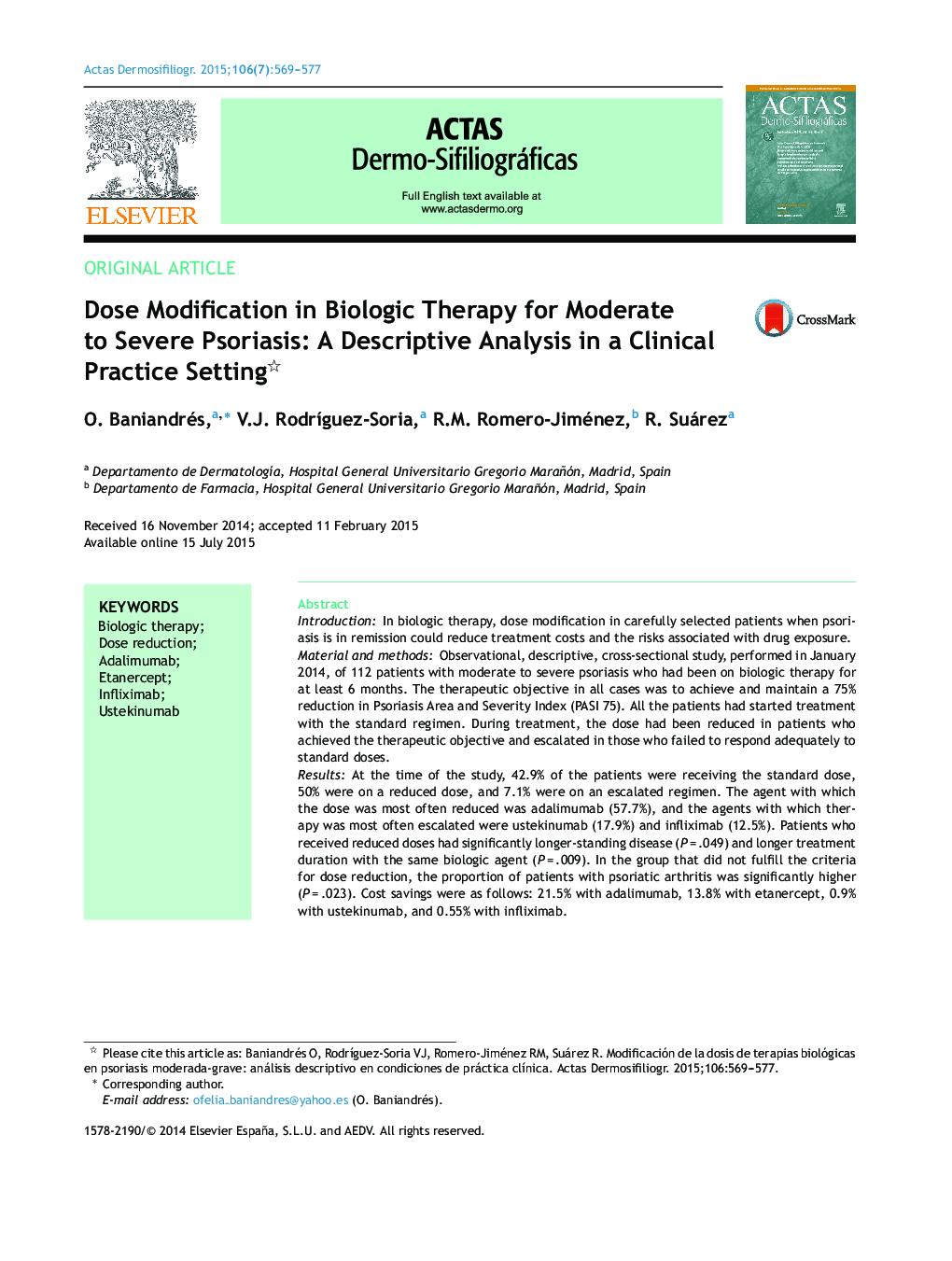| کد مقاله | کد نشریه | سال انتشار | مقاله انگلیسی | نسخه تمام متن |
|---|---|---|---|---|
| 3182728 | 1200667 | 2015 | 9 صفحه PDF | دانلود رایگان |
IntroductionIn biologic therapy, dose modification in carefully selected patients when psoriasis is in remission could reduce treatment costs and the risks associated with drug exposure.Material and methodsObservational, descriptive, cross-sectional study, performed in January 2014, of 112 patients with moderate to severe psoriasis who had been on biologic therapy for at least 6 months. The therapeutic objective in all cases was to achieve and maintain a 75% reduction in Psoriasis Area and Severity Index (PASI 75). All the patients had started treatment with the standard regimen. During treatment, the dose had been reduced in patients who achieved the therapeutic objective and escalated in those who failed to respond adequately to standard doses.ResultsAt the time of the study, 42.9% of the patients were receiving the standard dose, 50% were on a reduced dose, and 7.1% were on an escalated regimen. The agent with which the dose was most often reduced was adalimumab (57.7%), and the agents with which therapy was most often escalated were ustekinumab (17.9%) and infliximab (12.5%). Patients who received reduced doses had significantly longer-standing disease (P = .049) and longer treatment duration with the same biologic agent (P = .009). In the group that did not fulfill the criteria for dose reduction, the proportion of patients with psoriatic arthritis was significantly higher (P = .023). Cost savings were as follows: 21.5% with adalimumab, 13.8% with etanercept, 0.9% with ustekinumab, and 0.55% with infliximab.ConclusionsPatients with longer-standing disease and longer treatment duration with the same biologic agent were significantly more likely to be candidates for dose reduction. The proportion of patients with psoriatic arthritis was greater in the group of patients who did not fulfill the conditions for dose reduction. The overall cost saving achieved using the dose modification algorithm described in this study was 13%. Controlled studies are needed to define the profile of the patients best suited for dose reduction strategies without loss of treatment efficacy.
ResumenIntroducciónLa modificación de dosis de biológicos en pacientes con psoriasis en remisión adecuadamente seleccionados podría reducir el riesgo de exposición al fármaco y su carga económica.Material y métodosEstudio observacional, descriptivo y transversal en 112 pacientes con psoriasis moderada-grave tratados con biológicos durante ≥ 6 meses en enero de 2014. El objetivo consistió en alcanzar y mantener una respuesta PASI 75. Los pacientes iniciaron el tratamiento con la pauta estándar; en aquellos que cumplieron el objetivo se redujo la dosis, y cuando no alcanzaron la respuesta con la pauta estándar esta se intensificó.ResultadosUn 42,9% siguió la pauta estándar, un 50% la reducida y un 7,1% la intensificada. El fármaco con el que más se redujo la dosis fue adalimumab (57,7%) y los que más se intensificaron fueron ustekinumab e infliximab (17,9% y 12,5%). Los pacientes que recibieron dosis reducidas presentaron una psoriasis de más evolución (p = 0,049) y llevaban más tiempo en tratamiento con el mismo biológico (p = 0,009) (diferencias significativas). Hubo una proporción significativamente superior de pacientes con artritis psoriásica entre los no aptos a reducir dosis (p = 0,023). El ahorro del gasto fue del 21,5% con adalimumab, 13,8% con etanercept, 0,9% con ustekinumab y 0,55% con infliximab.ConclusionesPresentaron una probabilidad de reducción de dosis significativamente mayor aquellos pacientes con más tiempo de evolución y más tiempo bajo el mismo tratamiento biológico. Entre los pacientes sin reducción de dosis hubo mayor proporción con artritis psoriásica. El ahorro global con este algoritmo de modificación de dosis fue del 13%. Se requieren estudios controlados que ayuden a definir el perfil de paciente más adecuado para reducir la dosis sin pérdida de eficacia del tratamiento.
Journal: Actas Dermo-Sifiliográficas (English Edition) - Volume 106, Issue 7, September 2015, Pages 569–577
